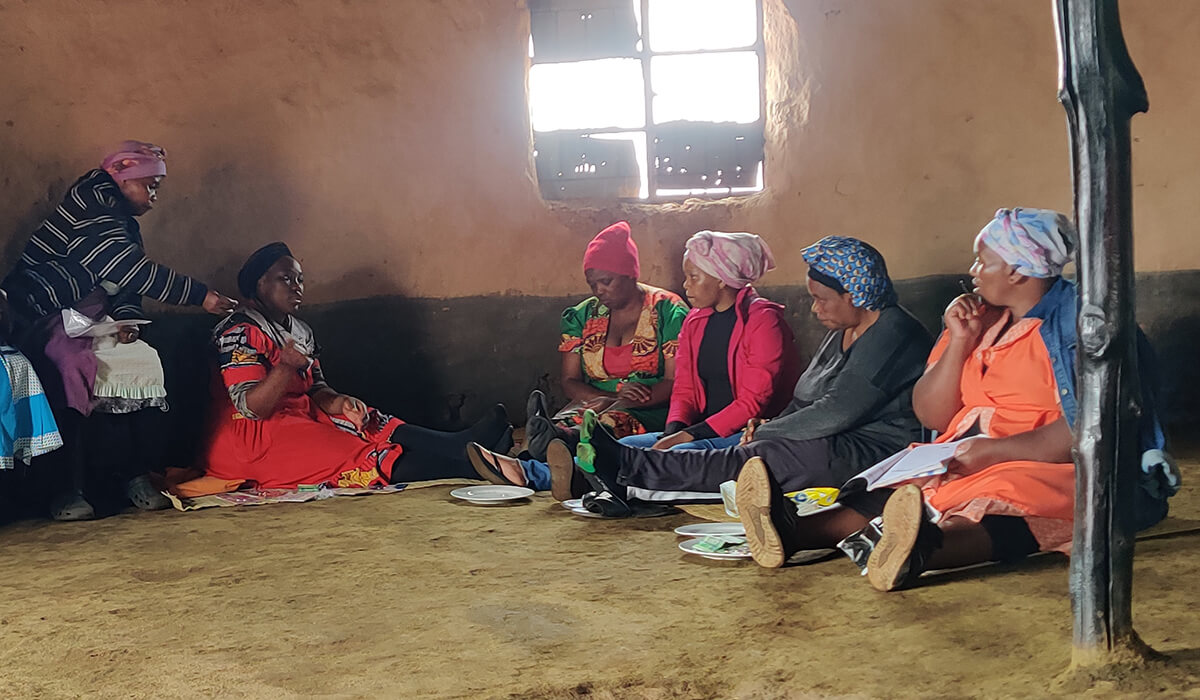"We need to empower the community, because if the community is not empowered, nothing can happen."
In the Ufafa Valley in KwaZulu-Natal, South Africa, a community once devastated by HIV/AIDS has made significant strides in improving the lives of its residents. At the turn of the 21st century, many community members blamed witchcraft for their misfortune, and this contributed to the fear, stigma, and denial that ran rampant through the region.
In response, Woza Moya emerged to provide health counselling. It has since grown into a community-based organisation that works for the good of all who call the Ufafa Valley home.
Woza Moya’s role in community-driven change
Woza Moya was founded in 2000 by three women, two of whom are from the Ufafa Valley community. They were assisted by 15 community caregivers who conducted door-to-door HIV/AIDS-related counselling. Through this work, they gained an understanding of how poverty, food insecurity, and minimal access to health care negatively impacted people’s lives. They resolved to develop a comprehensive approach to address the community’s diverse, self-identified needs.
 Woza Moya helps establish self-help groups to enable women to take ownership of solutions to their collective problems.
Woza Moya helps establish self-help groups to enable women to take ownership of solutions to their collective problems.
Working with the community, Woza Moya has developed programmes that address community health care, early childhood and youth development, and sustainable livelihoods. The Ufafa Valley is home to a traditional patriarchal community that has experienced high levels of out-migration of men in search of livelihoods. As a result, Woza Moya recognised the importance of supporting and empowering women to be independent and financially resilient.
Why Woza Moya adopted a community-driven change approach
Because Woza Moya emerged from the community, it has consistently placed the voice and needs of the community at the forefront of its programmes and operating model. Co-founder Jane Nxasane highlights its facilitatory role: “We don’t fish for people, instead we teach them how to fish.”
Through close and constant engagement, Woza Moya understands the community’s needs and develops programmes that address them. Being from the community has also generated a sense of accountability in everything Woza Moya does. It has become a community platform, from which the community takes ownership of the responsibility of developing individuals, families, and the broader community – always with a focus on women and youth.
Facilitating a shared vision and collective ownership
Early on, Woza Moya established a community advisory council to bring together stakeholders to discuss challenges and brainstorm ways for Woza Moya to help. The council, which includes religious representatives, traditional healers, women, youth, and elders, ensures that the community’s voice is always taken into consideration. Woza Moya also hosts monthly wellness days as a platform for community members to discuss their human rights issues and basic needs.
Community-driven change requires adapting existing norms while respecting local culture, traditions, and leadership. Woza Moya does this by facilitating platforms to discuss issues through a lens of enquiry, rather than actively challenging tradition. In this way, Woza Moya tailors its approach to align with community values.
For instance, Zulu culture has a tradition known as ukuhlambulula, which involves washing hands in a river after a funeral. However, river water carries a risk of disease transmission. So Woza Moya collaborated with traditional leaders to conduct an awareness campaign to educate the community on how to minimise this risk while ensuring that traditions are respected.
Strengthening the community’s leadership and asset base
Woza Moya also works to close gaps between the community and government. In one instance, it helped a young person whose mother died of HIV/AIDS to secure government assistance. “We are grateful to Woza Moya for making us aware of the government’s disability grant. Now he can go to school,” says the child’s relative.
Woza Moya addresses food insecurity by supporting gardening projects. These projects help households generate income by selling surplus produce. The gardening projects are particularly successful because of the community’s generational knowledge of agriculture and farming.
Focusing on equity
The high unemployment and poverty in the Ufafa Valley make it difficult for women to provide for their families. Those who are sole income earners for their family are particularly vulnerable to economic hardship. To address this, Woza Moya has established self-help groups and income-generating craft projects.
The self-help groups enable women to take ownership of solutions to their collective problems. For instance, women have organized collectives that promote group savings and provide members with low-interest loans to pay school fees, renovate dwellings, or access cash for emergencies.
The self-help groups also increase women’s confidence and self-reliance by providing a safe space for them to bond around a shared vision for a better life. Woza Moya provides training in bookkeeping, record keeping, and basic business management, and helps women open individual savings accounts. One woman started a successful floor polish business, attributing her ability to do so to the support she received in her self-help group. “I feel heard … and have a sense of confidence to share new ideas for starting a business. Earlier, I didn’t know if people would listen to me,” says the woman.
Outcomes in communities
The wellness days facilitated by Woza Moya have helped the community extend its voice beyond its own borders to participate in the Integrated Development Plans overseen by the municipality to generate solutions for long-term development. “Before Woza Moya, the community had no voice, [the Integrated Development Plan] used to get developed and no one questioned it. Now, Woza Moya helps amplify the community’s voice,” says Benedicta Memela, a co-founder.
Woza Moya also partners with the local government health clinic and hospital to facilitate testing, counselling, monitoring, education, and treatment at a monthly mobile clinic that visits the village community centre. Woza Moya’s collaboration with the Department of Health to promote wellness, including child health and immunisation, has greatly improved access to care, as community members no longer need to find funds to travel to receive services.

